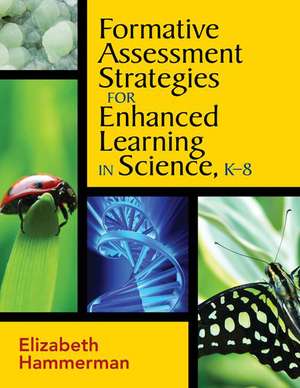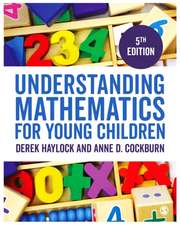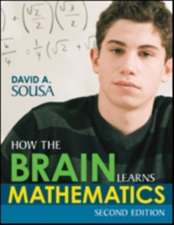Formative Assessment Strategies for Enhanced Learning in Science, K-8
Autor Elizabeth Hammermanen Limba Engleză Paperback – 17 noi 2008
"planning guides with examples and suggestions for differentiating instruction
"rubrics as a means of discovering student strengths and weaknesses
"additional specific tools for collecting student data to inform instructional decisions
Preț: 249.43 lei
Nou
47.73€ • 49.97$ • 39.49£
Carte tipărită la comandă
Livrare economică 07-21 aprilie
Specificații
ISBN-10: 1412962978
Pagini: 144
Dimensiuni: 216 x 279 x 13 mm
Greutate: 0.41 kg
Ediția:1
Editura: SAGE Publications
Colecția Corwin
Locul publicării:Thousand Oaks, United States
Recenzii
"Addresses the various assessments used in our schools, but most importantly how they can be approached to improve learning."
"With so many teachers trying to meet the needs of NCLB, using strategies that we find credible and do-able is a major goal. The many good suggestions with reasonable rationale make this a valuable book."
"The book fills a gap left open by many teacher credential programs: how to teach and assess science. New and veteran teachers will benefit from the specific examples of assessment strategies given and the prompts to reflect on practice."
Cuprins
The Goals of Formative Assessment Strategies for Enhanced Learning in Science
Uses for Formative Assessment Strategies for Enhanced Learning in Science
Acknowledgments
About the Author
Introduction
Student-Centered Instruction and Assessment
Changing Practice to Improve Learning
An Overview of Chapters
1. Formative Assessment and Science
New Ways of Thinking About Assessment
Goal-Centered Assessment
Research Support for Formative Assessment
Creating a Vision for Formative Assessment
Examining Beliefs and Practices
Traditional Versus Student-Centered Views of Assessment
Formative Assessment as "Authentic" Assessment
Clear Targets for Instruction and Assessment
2. Using Rubrics to Guide Learning
The What and Why of Rubrics
Holistic Rubrics
Designing Holistic Rubrics
Generalized Rubrics
Examples of Generalized Rubrics
Analytic Rubrics
Assessment Tasks With Analytic Rubrics
Designing Analytic Rubrics
Rubrics for Self-Assessment and Peer Assessment
Design a Rubric
3. Observation Checklists and Effective Questioning
Observation Checklists
Sample Observation Checklists
Effective Questioning
Questions for Thinking and Problem Solving
Questions for Instruction and Assessment
4. Notebooks, Reports, and Graphic Organizers
Notebooks
Notebooks as Assessment Tools
Rubric for a Science Notebook
Lab Reports
Lab Reports for Learning and Assessment
Rubric for a Lab Report
Graphic Organizers
Descriptive Organizers
Sequential Organizers
Process-Casual Organizers
Categorical Organizers
Comparison-Related Organizers
Problem-Solution Organizers
Four Corner Organizers
5. Projects and Presentations
Learning Through Projects
Assessing Projects
Rubric for a Project
Learning Through Presentations
Assessing Presentations
6. Performance Tasks and Embedded Assessments
Performance Assessment
Performance Tasks
A Generalized Rubric for a Performance Task
Embedded Assessments
A Model for Embedded Assessments
Sample Embedded Performance Task
Designing Embedded Performance Assessments
Performance Assessments Following Instruction
Sample Performance Assessments
Performance Assessment as Benchmark Assessment
Characteristics of Benchmark Assessments
Sample Benchmark Assessment
7. Planning and Implementing Formative Assessment
Characteristics of High-Quality Instruction and Assessment
Planning Formative Assessment
A Planning Guide for Formative Assessment
A Planning Guide for a Unit on Cells
Using Assessment Data to Modify Instruction
Project Choices
Adjusting Assignments
Stations for Active Learning
Differentiating Instruction Through Centers
Creating Contracts
Formative Assessment and Accountability
References and Further Reading
Index
Notă biografică
Elizabeth Hammerman is a dedicated science educator and consultant. Her professional background includes teaching science at the middle school and high school levels and over 20 years of experience teaching university science education courses and co-directing funded grant projects. She has done extensive professional development with teachers in the field, specializing in curriculum development and implementation, performance assessment, and effective teaching and learning. The need for high-quality professional development programs and materials in science education became apparent throughout the many projects and professional relationships with teachers who were eager to increase their knowledge base, skills, and confidence for teaching science more effectively.
Hammerman has co-authored a book on performance assessment in science and authored a database of science assessment tasks. She has published articles, presented programs at national conferences, consulted nationally, and developed curriculum and assessments for cutting-edge school districts and commercial products.
Since relocating to North Carolina in 1999, Hammerman has been a math/science consultant for a consortium of seven county school systems, has taught undergraduate and graduate courses in teacher education and science education, served as director of education and professional development for Virtual Learning Systems, and worked as a consultant for the North Carolina Department of Public Instruction. She is actively involved in professional development and continues to work on a series of professional development books for science education for Corwin Press.







